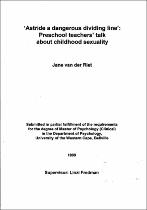| dc.description.abstract | The focus of this thesis is preschool teachers' talk about childhood sexualities. A literature review of empiricist, psychoanalytic, feminist, social constructionist and post-structural approaches to childhood sexuality suggests that it is a marginalized research topic. Moreover, emphasis tends to fall on the problems associated with childhood sexuality, rather than regarding it as part of everyday life. In this study, I facilitated a focus group discussion with eight preschool teachers. The complexities of analyzing a text produced by participants with
multiple identities are acknowledged: The discussion was hinged around vignettes and questions about childhood sexuality, and was transcribed into a written text. Using discourse analysis, I explore some of the 'taken-for-granted' assumptions about childhood sexuality, within 15 extracts from the text. I argue that multiple, paradoxical constructions of childhood sexuality position children 'astride a dangerous dividing line', which can be read on many levels. This unstable positioning both creates and is created by multiple discourses of 'taking charge'. The discourses of 'taking charge' impel preschool teachers to police 'dangerously' sexual children and protect 'innocent' children from corruption. These discourses are gendered: girl children are constructed as more vulnerable to corruption; boy children tend to be constructed with 'sexdrives' needing to be tamed; and adult women are constructed as the monitors of childhood sexuality. Furthermore, silences or taboos about childhood sexuality are integral to these discourses. Although there are hints of childhood agency, I suggest that the teachers themselves have limited access to or use for feminist and other liberatory discourses. More subtle resistance may be evident in many examples of laughter in the text. While this is project situated on the margins of psychology, by virtue of its subject, epistemology
and methodology, I conclude by discussing various limitations . | en_US |

